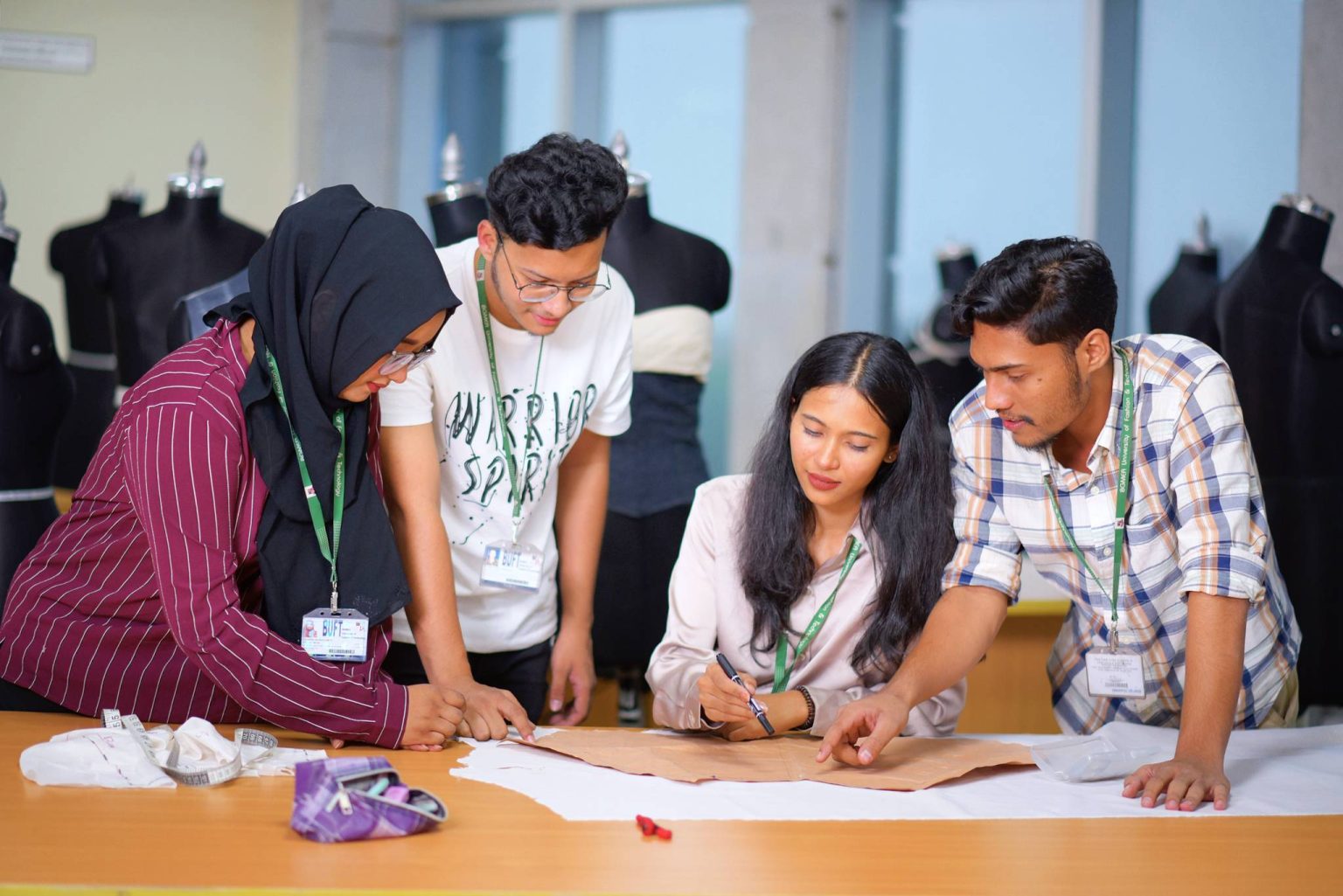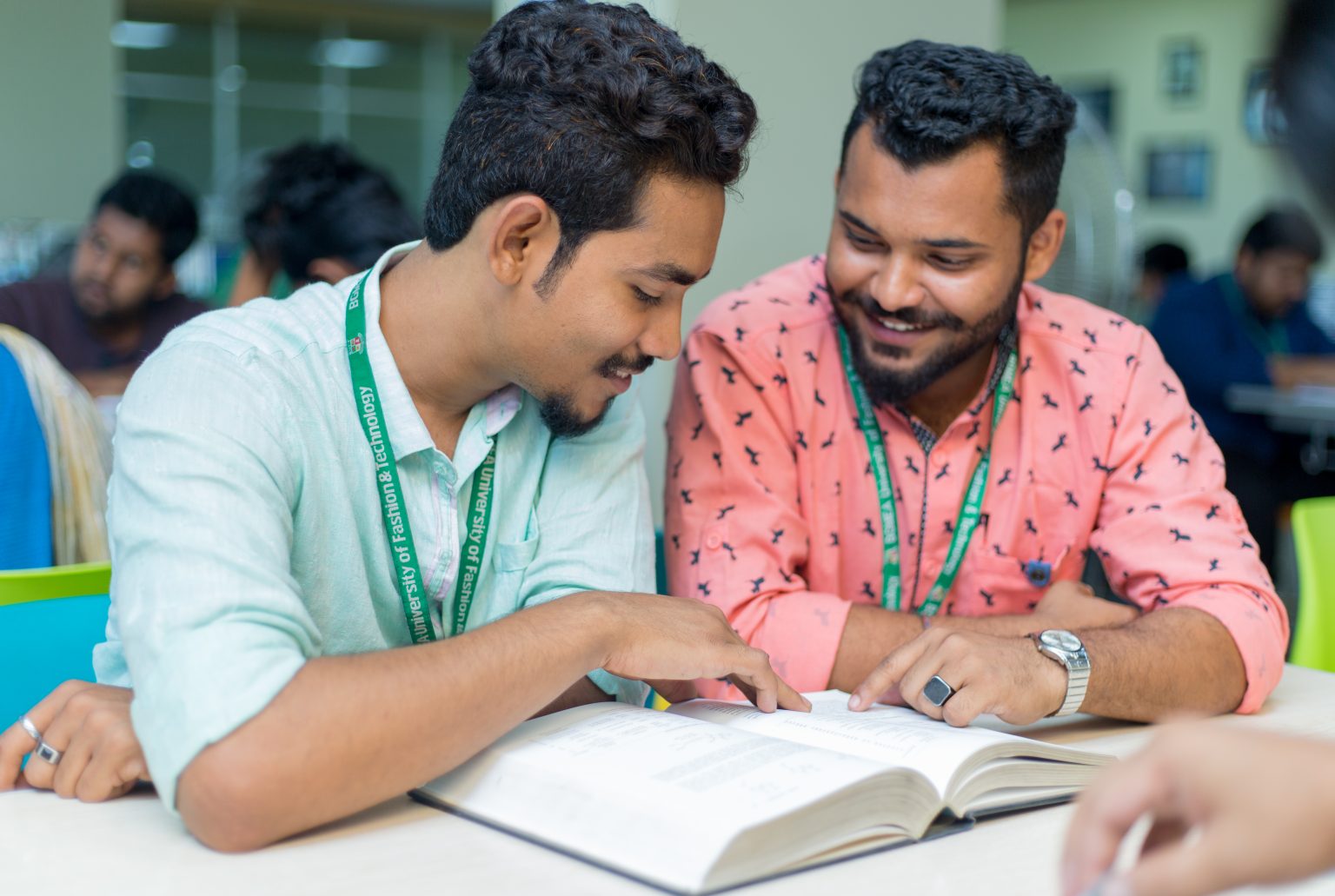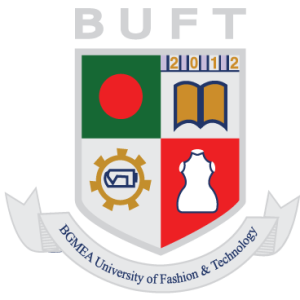The Department of Fashion Design & Technology is one of the most renowned departments for fashion design and technology in Bangladesh. The department engages its faculties and students with the most current ideas and methods in their particular field. Like workshops, seminars, research etc. It encourages the students as well as the faculties to develop their own identity and interests with very close connections to international and local industry. It also engages with the cultural resources of Bangladesh.
B.Sc. in Fashion Design and Technology program is one of BUFT’s original degree programs that has been preparing students for success at every level, from haute couture to ready-to-wear to the mass market.
The vision of this department is to train Fashion students to be technologically sound with new technologies, creative, balanced, and career-orientated as well as entrepreneurs. This department also gives training to its faculties by experts, as well as encourages them to do research, and to participate in various workshops and seminars.
M 1: This Department aims to educate students with a balanced and relevant curriculum that will help them discover their creativity by creative design processes, techniques and methods. Also with our teaching, research, creative activities, and industry partnerships.
M 2: This Department also focuses on improving its faculties by providing and developing various sorts of training program, seminars, workshops and encouraging them to publish innovative research papers in their certain fields.
Fashion industry is one of the most important sectors of Bangladesh. Bangladesh is known as the second largest exporter of garments in the world, with the accounting for 80 percent of Bangladesh’s total export earnings. B.Sc. in Fashion Design and Technology program at BUFT recognizes that a commercial framework is essential. That’s why students are encouraged to become industry leaders by focusing on innovation, experimentation, individual expression and the future of fashion through technology. Through these program students also builds close industry ties. It helps students to take advantage of the wide range of opportunities the industry can offer. The B.Sc. in Fashion design and technology degree provides students with the technical as well as conceptual knowledge and garment-making skills required transforming creative vision into compelling fashion statements. Also, they can gain hands-on experience with 250 hours of internship and career-focused workshops included in the program. We focus on encouraging students to improve creativity based on their expertise and connecting them with the global fashion industry.
The B.Sc. in Fashion Design and Technology curriculum offers students the creative, technical and professional skills needed to succeed as a fashion designer in the competitive ready-to-wear fashion market. The program develops the core skills of research, design, pattern, and realization of menswear, women swear, and children wear. The skill sets enhance opportunities for the student to set their career in the industry. The curriculum is also flexible and provides scope for professional networking. B.Sc. in Fashion Design and Technology focuses on active learning through project-based enquiry. Through this, they can work in various Interdisciplinary and Collaborative projects as well. The program may involve cross-pathway teams and work with external professionals, sponsoring companies and organizations.
The program consists of eight academic semesters and a total of 145 credits. Each semester contains modules from Majors, Deepening Specializations, Interdisciplinary Minors and General Electives. Academic Majors are the academic disciplines or program-related courses which the undergraduate students formally complete. Students are allowed to deepen their understanding of their core majors through a Deepening Specialization, which gives them a further edge in specific industries. Interdisciplinary Minors provide individuated pathways that would permit students to acquire multidisciplinary skill sets and opt for a group of subjects that complement studies in one’s major or explore an unrelated area of intellectual interest. General Electives are offered to the students to help them enhance their personality and develop interests in specific areas like values, personality development and character building, soft skills, communication skills, critical thinking skills, professional ethics etc.
The program creates a learning environment in which innovation is nurtured across four distinct but closely related pathways. Through this structure, we encourage versatile fashion specialists who can solve problems creatively. We aim to equip you with in-depth knowledge of your chosen field as well as a wider breadth of the industry. Alongside your specialism, you will learn about the social, economic and cultural factors which impact the professional realm in which you will work.

B. Sc. in FDT program is mainly the field of study related fashion design and its related techniques & technology and its application. Students who opt for the program complete an identical basic study stage, and then get the opportunity to choose their core study areas in the final year.
The core study area in fashion design & technology delivers fundamental knowledge and insights extending from fashion illustration via pattern drafting, pattern grading, advanced pattern, draping, e-fashion, CAD through to final dress submission and design studio. Subjects from the fields such as basic sciences, production engineering, business and humanities set the key accents in this program.
Students acquire a particular knowledge of the relevant techniques used in pattern drafting, pattern grading, advanced pattern, draping, e-fashion and CAD.
The BSc in FDT program consists of eight academic semesters and a total of 145 credits. Each semester is subdivided into modules from the fields of: core courses (Fashion Design & Technology) and others (natural sciences, humanities, business and other allied engineering). In addition, students are offered a total of six non-credits English courses. The degree program is completed with an 8-week internship which the students do in a company, followed by the production of a Bachelor’s Thesis (Final Year Project, FYP).
The educational objectives of the B.Sc. in Fashion Design and Technology program are as follows:
PEO 2: Familiarize students with core courses of fashion design and technology, which will make them a firm designer. It will also them help them to evolve their inner creativity and evaluate the environment and social impact of the fashion industry when developing their design concept.
PEO 3: Provide a good technical knowledge in the practice of Fashion Analysis, Fashion Detailing, Surface Ornamenting, Accessories designs, Innovative craft, As well as explore various Trend Analysis & Product Conceptualization of Fashion and Technology in the real world. It will also prepare students for the fourth industrial revolution by providing them various technical training based on new technologies.
B.Sc. in Fashion Design and Technology graduates will be able to:
PLO 2 Problem analysis: Students will be able to solve various sorts of complex design.
PLO 3 Design/development of solutions: By market analysis, they will identify fashion trends and conceptual development of products, materials, and making. The learning process will help their creativity boost, which will help them to develop innovative products.
PLO 4 Business knowledge: Learn to use fashion knowledge and management, marketing, and entrepreneurship knowledge to adapt in the industry to do something of their own.
PLO 5 Usage of modern technology: Learn to utilize their CAD knowledge and techniques in various fashion fields, including graphics work and 3D modeling technology.
PLO 6 Fashion and society: They will learn to make fashionable item while maintaining the context of community, health, safety, legal, cultural issues and the consequent responsibilities relevant to the professional design practices.
PLO 7 Environment and sustainability: Students will learn to make sustainable and ecological products to understand the impact of fashion on the environment, which will improve the world’s condition better.
PLO 8 Ethics: There will be various courses that will teach them ethical principles and professional ethics, responsibilities, and norms of the technical practices to help them easily indulge in any industry.
PLO 9 Collaborative work: Function effectively as an individual and member or leader in diverse teams and multidisciplinary settings.
PLO 10 Communication: Learn to take and give command in a team in various complex activities related to fashion and design, also in society at large, such as being able to comprehend and write effective reports and design documentation, make effective presentations.
PLO 11 Adaptability: They will learn to demonstrate their designing ability to fast learning new skills and behaviors changing circumstances.
PLO 12 Life-long learning: Recognize the need for, and have the preparation and ability to engage in independent and life-long learning in the broadest context of technological change.

Core departmental courses are divided into four primary fields of study: yarn manufacturing engineering, fabric manufacturing engineering, wet processing engineering and apparel manufacturing engineering. Students who opt for the program complete an identical basic study stage, and then get the opportunity to choose their core study areas.
The graduate program is completed with the production of a Master’s Thesis cost of six credits.
The educational objectives of M.Sc. in Fashion Design program are as follows:
PEO 2: Familiarize students with core courses of fashion design and technology, which will make them a firm designer. It will also help them to evolve their inner creativity and evaluate the environment and social impact of the fashion industry when developing their design concept.
PEO 3: Provide a good technical knowledge in the practice of fashion analysis, fashion detailing, surface ornamenting, accessories designs, innovative craft, as well as explore various trend analysis & product conceptualization of fashion and technology in the real world. It will also prepare students for the fourth industrial revolution by providing them various technical training based on new technologies.
M.Sc. in Fashion Design graduates will be able to:
PLO 2 Problem solving skills: Students will be able to solve various sorts of complex designs.
PLO 3 Design and development of solutions skills: By market analysis, they will identify fashion trends and conceptual development of products, materials, and making. The learning process will help their creativity boost, which will help them to develop innovative products.
PLO 4 Modern tool usage skills: Learn to utilize their CAD knowledge and techniques in various fashion fields, including graphics work and 3D modeling technology.
PLO 5 Social: They will learn to make fashionable items while maintaining the context of community, health, safety, legal, cultural issues and the consequent responsibilities relevant to the professional design practices.
PLO 6 Environment and sustainability: Students will learn to make sustainable and ecological products to understand the impact of fashion on the environment, which will improve the world’s condition better.
PLO 7 Ethics, Integrity, Citizenship: There will be various courses that will teach them ethical principles and professional ethics, responsibilities, and norms of the technical practices to help them easily indulge in any industry.
PLO 8 Communication skills, Skill to work with people, Ability to instruct, Participation skills: Learn to take and give command in a team in various complex activities related to fashion and design, also in society at large, such as being able to comprehend and write effective reports and design documentation, and make effective presentations.
PLO 9 Ability to present oneself as a resource person, Ability to make publications in conferences, workshops, seminars, Ability to pursue specialized higher studies.: Recognize the need for, and have the preparation and ability to engage in independent and life-long learning in the broadest context of technological change.
Enter your email address to get the latest University news, special events and student activities delivered right to your inbox.

Copyright©BUFT